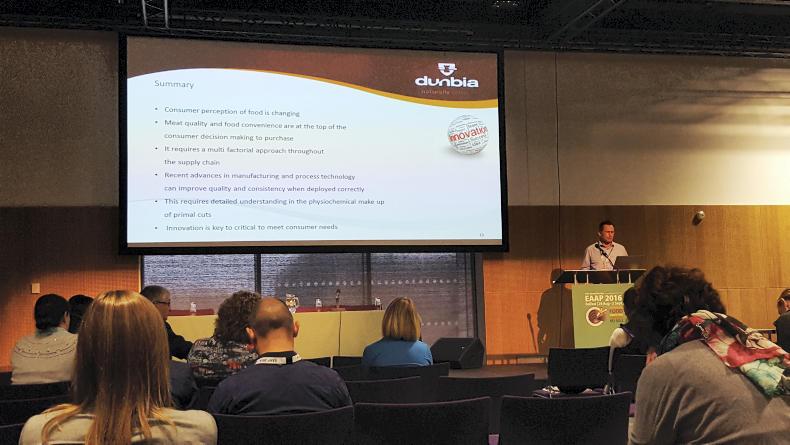Beef farmers in the UK will be subject to greater market exposure in the supply chain in the future, Jonathan Birnie from Dunbia said on Thursday at the European Federation of Animal Science (EAAP) conference in Belfast.
Speaking about sustainability of the cattle supply chain, Birnie said that although there is considerable uncertainty going forward surrounding Brexit, farmers need to produce what the market requires as efficiently as possible to remain viable in the future.
“The outlook ultimately depends on us and the requirement for increasing efficiencies in production,” he said. Birnie added that by breeding cattle that finish earlier at light weights, farmers could improve efficiency and deliver a consistent product that consumers want.
Lower payments, higher prices
He predicted that payments to farmers from both the UK’s post-Brexit agricultural policy and the EU’s CAP will reduce. Meanwhile, he expects beef prices will rise, but added that this would not be to the extent where beef prices compensate for reduced subsidy payments to all farmers. “The economics are going to have to sort themselves out,” he said.
Birnie said that the number of suckler cows would be dependent on subsidies. He predicted that suckler cow numbers would reduce whilst the dairy herd increases, meaning beef production would reduce by 10-15% before levelling out and increasing again in the longer term.
The long-term market signals for beef are very positive
“The long-term market signals for beef are very positive. We will see growth of demand from increasing population and affluence and a slower growth of supply which will lead to ongoing price rises,” he said.
Listen to George Williamson from Dunbia speak about on variations in cattle and processors communicating with farmers in our podcast below:
Read more
Over 1,500 attend Belfast livestock conference
NI science takes the centre stage
Genetics of feed efficiency and methane emissions
Beef farmers in the UK will be subject to greater market exposure in the supply chain in the future, Jonathan Birnie from Dunbia said on Thursday at the European Federation of Animal Science (EAAP) conference in Belfast.
Speaking about sustainability of the cattle supply chain, Birnie said that although there is considerable uncertainty going forward surrounding Brexit, farmers need to produce what the market requires as efficiently as possible to remain viable in the future.
“The outlook ultimately depends on us and the requirement for increasing efficiencies in production,” he said. Birnie added that by breeding cattle that finish earlier at light weights, farmers could improve efficiency and deliver a consistent product that consumers want.
Lower payments, higher prices
He predicted that payments to farmers from both the UK’s post-Brexit agricultural policy and the EU’s CAP will reduce. Meanwhile, he expects beef prices will rise, but added that this would not be to the extent where beef prices compensate for reduced subsidy payments to all farmers. “The economics are going to have to sort themselves out,” he said.
Birnie said that the number of suckler cows would be dependent on subsidies. He predicted that suckler cow numbers would reduce whilst the dairy herd increases, meaning beef production would reduce by 10-15% before levelling out and increasing again in the longer term.
The long-term market signals for beef are very positive
“The long-term market signals for beef are very positive. We will see growth of demand from increasing population and affluence and a slower growth of supply which will lead to ongoing price rises,” he said.
Listen to George Williamson from Dunbia speak about on variations in cattle and processors communicating with farmers in our podcast below:
Read more
Over 1,500 attend Belfast livestock conference
NI science takes the centre stage
Genetics of feed efficiency and methane emissions






 This is a subscriber-only article
This is a subscriber-only article










SHARING OPTIONS: